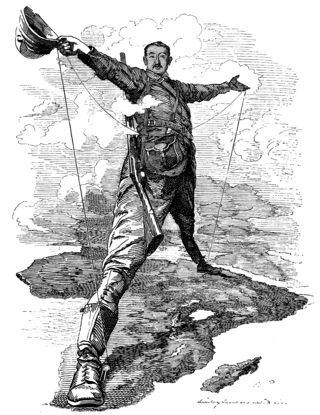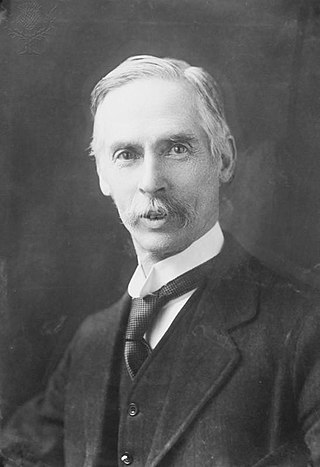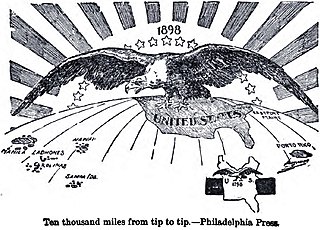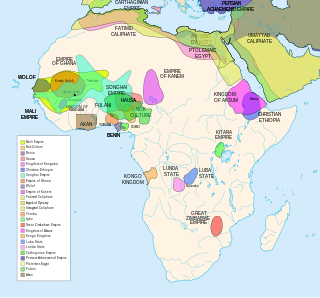
Imperialism is the maintaining and extending of power over foreign nations, particularly through expansionism, employing both hard power and soft power. Imperialism focuses on establishing or maintaining hegemony and a more or less formal empire. While related to the concept of colonialism, imperialism is a distinct concept that can apply to other forms of expansion and many forms of government.

In historical contexts, New Imperialism characterizes a period of colonial expansion by European powers, the United States, and Japan during the late 19th and early 20th centuries. The period featured an unprecedented pursuit of overseas territorial acquisitions. At the time, states focused on building their empires with new technological advances and developments, expanding their territory through conquest, and exploiting the resources of the subjugated countries. During the era of New Imperialism, the European powers individually conquered almost all of Africa and parts of Asia. The new wave of imperialism reflected ongoing rivalries among the great powers, the economic desire for new resources and markets, and a "civilizing mission" ethos. Many of the colonies established during this era gained independence during the era of decolonization that followed World War II.

John Atkinson Hobson was an English economist and social scientist. Hobson is best known for his writing on imperialism, which influenced Vladimir Lenin, and his theory of underconsumption.

Pax Britannica refers to the relative peace between the great powers in the time period roughly bounded by the Napoleonic Wars and World War I. During this time, the British Empire became the global hegemonic power, developed additional informal empire, and adopted the role of a "global policeman".

American imperialism is the expansion of American political, economic, cultural, media, and military influence beyond the boundaries of the United States of America. Depending on the commentator, it may include imperialism through outright military conquest; military protection; gunboat diplomacy; unequal treaties; subsidization of preferred factions; regime change; economic or diplomatic support; or economic penetration through private companies, potentially followed by diplomatic or forceful intervention when those interests are threatened.

The Scramble for Africa was the conquest and colonisation of most of Africa by seven Western European powers driven by the Second Industrial Revolution during the late 19th century and early 20th century in the era of "New Imperialism": Belgium, France, Germany, United Kingdom, Italy, Portugal and Spain.

Imperialism: A Study (1902), by John A. Hobson, is a politico-economic discourse about the negative financial, economic, and moral aspects of imperialism as a nationalistic business enterprise. Hobson argues that capitalist business activity brought about imperialism.
Ronald "Robbie" Edward Robinson, CBE, DFC, FBA was a distinguished historian of the British Empire who between 1971 and 1987 held the Beit Professorship of Commonwealth History at the University of Oxford.

The historical phenomenon of colonization is one that stretches around the globe and across time. Ancient and medieval colonialism was practiced by the Phoenicians, Greeks, Romans, Han Chinese, and Arabs.

The historiography of the British Empire refers to the studies, sources, critical methods and interpretations used by scholars to develop a history of the British Empire. Historians and their ideas are the main focus here; specific lands and historical dates and episodes are covered in the article on the British Empire. Scholars have long studied the Empire, looking at the causes for its formation, its relations to the French and other empires, and the kinds of people who became imperialists or anti-imperialists, together with their mindsets. The history of the breakdown of the Empire has attracted scholars of the histories of the United States, the British Raj, and the African colonies. John Darwin (2013) identifies four imperial goals: colonising, civilising, converting, and commerce.
William Roger Louis CBE FBA, commonly known as Wm. Roger Louis or, informally, Roger Louis, is an American historian and a professor at the University of Texas at Austin. Louis is the editor-in-chief of The Oxford History of the British Empire, a former president of the American Historical Association (AHA), a former chairman of the U.S. Department of State's Historical Advisory Committee, and a founding director of the AHA's National History Center in Washington, D. C.
The term informal empire describes the spheres of influence which a polity may develop that translate into a degree of influence over a region or country, which is not a formal colony, protectorate, tributary or vassal state of empire, as a result of its commercial, strategic or military interests.
John Andrew Gallagher, known as Jack Gallagher, was an historian of the British Empire who between 1963 and 1970 held the Beit Professorship of Commonwealth History at the University of Oxford and from 1971 until his death was the Vere Harmsworth Professor of Imperial and Naval History at the University of Cambridge.
David Kenneth Fieldhouse, FBA was an English historian of the British Empire. Fieldhouse was born to missionary parents in Mussoorie, northern India. He was sent to England for his education at Dean Close School, Cheltenham, from 1938 to 1943. Fieldhouse then completed naval service, before reading history at The Queen's College, Oxford.

Egypt–United Kingdom relations are the diplomatic, economic, and cultural relationships between Egypt and the United Kingdom. Relations are longstanding. They involve politics, defence, trade and education, and especially issues regarding the Suez Canal.
The official mind is the ideas, perceptions, and intentions of those policy-makers who had a bearing on British imperial policies. The policy maker is a politician or civil servant who had influence over imperial policy.
The Cambridge School of historiography was a school of thought which approached the study of the British Empire from the imperialist point of view. It emerged especially at the University of Cambridge in the 1960s. John Andrew Gallagher (1919–80) was especially influential, particularly in his article with Ronald Robinson on "The Imperialism of Free Trade".
The Journal of Imperial and Commonwealth History is a peer-reviewed academic journal covering the history of the British Empire, colonial and settler colonial histories, Commonwealth histories and comparative European colonial experiences. It was established in 1972 by Trevor Reese. It was first published by Frank Cass and more recently by Taylor & Francis. There are six issues per year.
This Timeline of European imperialism covers episodes of imperialism outside of Europe by western nations since 1400; for other countries, see Imperialism § Imperialism by country.

Africa and the Victorians: The Official Mind of Imperialism is a 1961 book by Ronald Robinson and John Andrew Gallagher, with contributions from Robinson's wife, Alice Denny. The book argues that British involvement in the Scramble for Africa occurred largely to secure its empire, specifically routes to India and was a strategic decision. It was well received upon publication and is considered an influential work.









